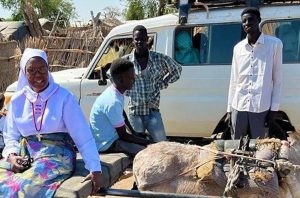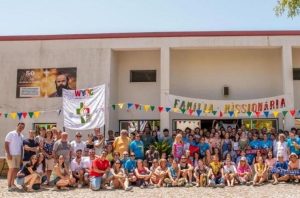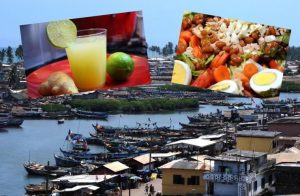She organized community efforts to stop mining development by British mining company Anglo American in Brazil’s Amazon rainforest.
Brazil is one of the five largest mineral producers in the world, with much of the activity concentrated in the Amazon region. Mining caused nearly 3 million acres of deforestation between 2005 and 2015. In 2019, the Bolsonaro administration began taking unprecedented measures to decrease the enforcement of environmental protections and encourage the exploitation of natural resources in the Amazon.
One proposed piece of legislation – Bill 191 – sought to facilitate the expansion of mining in the Amazon even more quickly, without the right to free, prior, and informed consent of local communities.
The Sawré Muybu Indigenous Territory, located in the state of Para in northern Brazil, contains approximately 439,000 acres of Amazon rainforest along the Tapajós River. The area, home to some communities of the Munduruku people, is not formally recognized by the Brazilian government and, as such, has been under constant threat from mining, hydroelectric projects, logging, and seizing land for cattle ranching.
Between 2011 and 2020, 97 mining applications were filed within the territory – the most of any Indigenous territory in the country. Illegal mining in the territory has also significantly increased since 2020. Contamination of the Tapajós River was increasing – driven in part by mercury used in illegal mining – killing off local fish populations and poisoning residents.
A 2020 report revealed that Anglo American, one of the world’s largest mining companies, had 13 copper mining research applications in Munduruku territory, with five of those requests submitted between 2017 and 2019.
Alessandra Korap Munduruku, 38, is a member of the Munduruku Indigenous group of Sawré Muybu. She is the president of the Pariri Indigenous Association, which supports communities in the Tapajós River region. Alessandra previously worked as a teacher and, over the past decade, became involved in the fight against deforestation, hydroelectric development, and contamination of the Tapajós River.
Initially, she encountered stiff resistance to a woman becoming involved in the movement to protect the territory, but she persisted and, gradually, changed the paradigm; she eventually became the first woman coordinator of the Pariri Indigenous Association.
In 2018, Alessandra decided to study law to better represent and protect Munduruku communities and the Amazon rainforest from further illegal extraction by mining, logging, and drilling interests, and other threats to their territories.
Upon learning of Anglo American’s mining applications, Alessandra immediately raised the alarm at community meetings. She informed others of the newest mining bids, outlined the risks from mining development, and explained the doctrine of free, prior, and informed consent.
Consulting extensively with elders, traditional chiefs, and healers for guidance, Alessandra developed a campaign strategy and led fundraising efforts. The Munduruku continued to conduct patrols of the territory and measure levels of deforestation. This included the annual demarcation of the boundaries of the Sawré Muybu forest. These efforts often involved gruelling expeditions into remote rainforests.
In a December 2020 assembly, 45 chiefs and 200 participants drafted and published an official declaration against further mining activity and deforestation of the Amazon.
Alessandra collaborated with the Articulation of Indigenous Peoples of Brazil (APIB) and Amazon Watch in crafting an open letter to Anglo American citing the assembly’s declaration and calling for withdrawal of the permits. In response, Anglo American disingenuously disputed the number of approved applications, claiming to have no exploratory permits in Indigenous territories but not ruling out future mining activities on those lands.
Working with allies, Alessandra sent a response demanding clarification and immediate action by Anglo American to withdraw the permits. She exclaimed, “We are here, and we will continue here. Anglo American out! The people will continue to resist.”
Alessandra expanded the media campaign to include filmed statements by community members and photos of villages displaying ‘Anglo American Out of Sawré Muybu’ signs. She partnered with Amazon Watch and Greenpeace to draw additional attention and, serving as spokeswoman, spread the message at every possible venue, including conferences and international forums.
After months of intense pressure by Alessandra and her coalition, in May 2021, Anglo American formally announced its commitment to withdraw 27 approved mineral research permits in Indigenous territories in the Amazon, including 13 copper mining research permits located within the rainforests in Sawré Muybu. The company officially informed the Brazilian government of the withdrawal, citing concerns raised by organizations and Indigenous communities.
Alessandra’s successful campaign represents a significant shift in private sector accountability around destructive mining in Brazil amid an intense government push for extraction in the Amazon. Following Anglo American’s decision, mining giant Vale announced a similar withdrawal of all prospecting permits on Indigenous lands in Brazil.
In 2022, an internal survey of the Brazilian Mining Association (Ibram) found that, for the first time in decades, none of its 130 companies had current mining applications in Indigenous territories. Furthermore, Ibram has announced its opposition to Bill 191, which was heavily promoted by former President Jair Bolsonaro.
Experts are hopeful that the protections for Indigenous communities and rainforests will increase during the new administration. Last April, Alessandra received the Goldman Environmental Prize, known as the “Green Nobel Prize”. (The Goldman Environment Report – Photo Goldman Environmental Prize)








